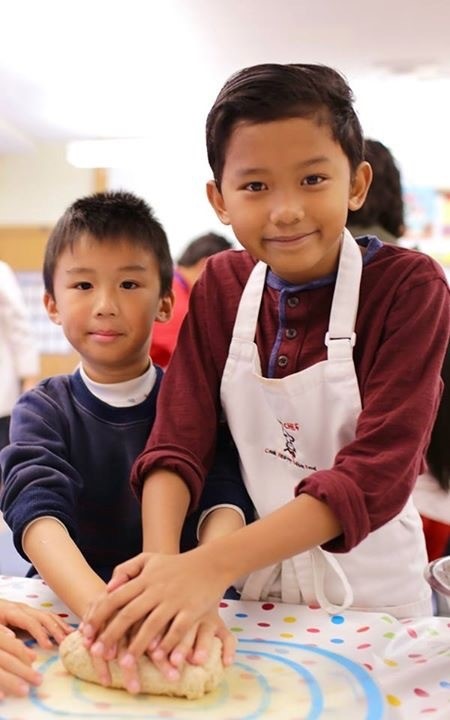“Who knows what an aubergine is?” The teacher asks the question and a multitude of eager little hands shoot into the air, all belonging to Grade 3 students ready to burst with the word “eggplant.” This is a cooking class for kids, complete with knife skills, at the end of which a nice plate of real food will be ready to eat. This is Project CHEF.
Each class has the raw ingredients, a recipe, and an instructor who walks the students through the cooking process, including the how and why of each step. Smiles abound in this Grade 3 class at Queen Mary Elementary School in West Point Grey, with kids eager to taste the raw rhubarb that will eventually become the core of a crumble. Why baking soda works the way it does, how important it is to butter the pan, and how to make a perfect crumble crust are all part of this lesson.
Project CHEF (Cook Healthy Edible Food)’s founder Barb Finley was a teacher for many years, and then became a member of the University of British Columbia’s Faculty of Education. But something else started to tug at her. “I was in many different schools with student teachers, and I saw what kids ate,” she recalls. “I decided something had to be done to change what kids eat. And I knew the best way to do that was to get them involved and engaged.” Thus began the Vancouver-based Project CHEF, now in its ninth year.
The core of it all is an in-residence program, in which Finley’s dedicated, small team of cooking instructors come to a school, and every student in every grade receives a five-day course. Schools are selected on a lottery basis, because “there is much more demand than we can fill,” says Finley. “We have had requests from over 50 school districts across the country. So one day, hopefully, we can do this on a larger scale.”
“I decided something had to be done to change what kids eat. And I knew the best way to do that was to get them involved and engaged.”
Project CHEF works closely with the Vancouver School Board to make sure that lesson plans touch on elements that are part of each grade’s curriculum. “The children are learning to cook, but also there are reading skills, interpersonal skills, team-building,” says Finley. “A lot of various elements come into play.” The students get to understand not only how to use these lifelong tools, but also where food comes from, how to find the right ingredients at a market, and how valuable sharing a family meal around the table really is.
There is also a special program for at-risk children, in which they participate in the course and then are given a bag of groceries to take home, where they can replicate what they learned in class that day. “This is food literacy through cooking,” says Finley. “We even have a session in which all the teachers are invited, and family members are asked to join the classes as well. Project CHEF touches the teachers and the families directly.”
It all fits into what Finley sees as a healthy environment in which to grow up. The entire food cycle, from original source through to family meal, is taken into account. Project CHEF is a non-profit organization, so fundraising efforts are crucial, since the schools themselves can only afford a portion of what the programs cost. “All I know for sure is that we have to be completely prepped and ready when the children arrive at the classroom door,” says Finley. “They are ready to roll right away.” Rhubarb crumble, anyone?
Get inspired with more stories from our Impact section.











